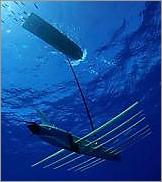
New observational technologies are greatly complicating oceanographic research, even as they present tantalizing opportunities. Because they are less expensive and more networked than ship-based measurements, remotely operated vehicles like undersea drones and satellites can provide an unprecedented amount of data while democratizing the research process. However, these new tools also challenge existing maritime codes such as the United Nations Convention on the Law of the Sea. During the 2015-2016 academic year, Geography, Environment and Society PhD candidate Jessica Lehman was awarded a Consortium Research Grant to explore how these new technologies have become entangled in questions of territory, information-sharing, and politics. Lehman notes, “Concerns about global environmental crises such as climate change push scientists to collect more data and make it freely available online, but nations are concerned that these data may compromise their sovereignty, from military operations to fisheries development. To address these concerns, we can’t make assumptions about relationships between security and new technologies; we have to follow them into the world and see what they are actually doing.” Her Consortium-funded research informed her dissertation, which evaluated the interfaces between geopolitics and international oceanographic science. Lehman is currently an AW Mellon Postdoctoral Fellow in the Center for the Humanities at the University of Wisconsin, Madison; to learn more about her research, click here.